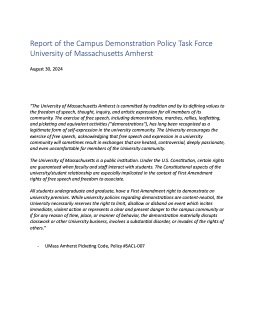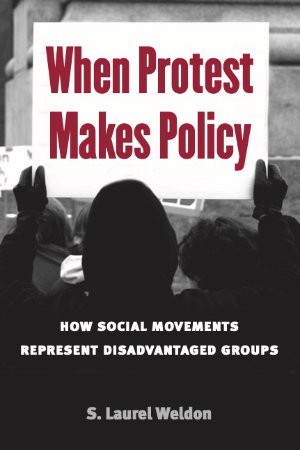By The University of Massachusetts Amherst. Campus Demonstration Policy Taskforce
Formed by Chancellor Reyes on June 17, 2024, the Campus Demonstration Policy Taskforce was charged with: • Reviewing demonstration-related policies/guidelines including, but not limited to, the land-use policy, picketing code, and demonstration guidelines and make recommendations to the appropriate university governing bodies. • Making recommendations, based on best practices in higher education, regarding methods of demonstration-related intervention, including, but not limited to, the deployment of and composition of the Demonstration Response and Safety Team (DRST). • Making recommendations, based on best practices in higher education, regarding how to increase awareness of university policies and First Amendment protections as they apply to on-campus demonstrations. Between its formation on June 17, 2024, and the delivery of this report on August 30, 2024, the taskforce met six times. The subcommittees met ten times. Significant asynchronous discussion and document review was also completed via a shared Teams channel. The Campus Demonstration Policy Taskforce (CDPT) was guided by and fully endorses the text and spirit of the UMass Amherst Picketing Code, excerpted above, which is itself informed and backed by the First Amendment of the United States Constitution. The importance of clear policies – and the consistent application of them without regard to the subject matter of demonstrations (content neutrality) or the viewpoints expressed in them (viewpoint neutrality) - was a near-universal theme in a national workshop co-hosted by UMass Amherst during the CDPT’s work. This underscored the criticality of the CDPT’s charge. Throughout its work, the CDPT set out to ensure that the university’s policies reflect a commitment to the free and open exchange of ideas while equally protecting the rights of all to live, work, teach, and learn in a community of inquiry. The CDPT makes several recommendations in three areas: • clarify policy where reasonable interpretations could lead to divergent understandings; • strengthen the ability of the Demonstration Response and Safety Team (DRST) to serve the campus through its role providing demonstration-related safety, education, and deescalation; and • delineate the e distinct roles of university administrators and UMPD in terms of handling violations of policy and illegal acts, respectively. Specifically, we make the following substantive recommendations regarding the Land Use Policy: 1) adopt a definition of “Structure” informed by Massachusetts law; and 2) clarify the role of the University of Massachusetts Police Department (UMPD) in relation to policy enforcement and law enforcement Regarding the DRST, the CPDT recommends the following: 1) create an advisory council to the DRST that includes representatives from outside the university administration; 2) actively seek out post-action reports from other universities for review by the DSRT and advisory board; 3) develop off-ramps oriented towards de-escalating the potential for conflict, including building up a mediation infrastructure; 4) specify procedures for the identification of demonstrators that are UMass community members; and 5) clarify the use of law enforcement in relation to illegal acts, including violent acts, threats of public safety, substantial disorder, trespass, and the invasion of the rights of others, as opposed to policy violations. This also applies to a recommended edit in the Land Use Policy. The CDPT was also asked to provide guidance around “increasing awareness” of demonstration related policies. To that end, the task force 1) created a Free Expression FAQ, attached to this report, that we recommend sharing with the university community; 2) updated DRST handouts that can be shared with demonstrators; and 3) recommends a central website that shares all demonstration-related policies and guidance. e distinct roles of university administrators and UMPD in terms of handling violations of policy and illegal acts, respectively. Specifically, we make the following substantive recommendations regarding the Land Use Policy: 1) adopt a definition of “Structure” informed by Massachusetts law; and 2) clarify the role of the University of Massachusetts Police Department (UMPD) in relation to policy enforcement and law enforcement Regarding the DRST, the CPDT recommends the following: 1) create an advisory council to the DRST that includes representatives from outside the university administration; 2) actively seek out post-action reports from other universities for review by the DSRT and advisory board; 3) develop off-ramps oriented towards de-escalating the potential for conflict, including building up a mediation infrastructure; 4) specify procedures for the identification of demonstrators that are UMass community members; and 5) clarify the use of law enforcement in relation to illegal acts, including violent acts, threats of public safety, substantial disorder, trespass, and the invasion of the rights of others, as opposed to policy violations. This also applies to a recommended edit in the Land Use Policy. The CDPT was also asked to provide guidance around “increasing awareness” of demonstrationrelated policies. To that end, the task force 1) created a Free Expression FAQ, attached to this report, that we recommend sharing with the university community; 2) updated DRST handouts that can be shared with demonstrators; and 3) recommends a central website that shares all demonstration-related policies and guidance.
Amherst: University of Massachusetts Amherst, 2024. 11p.









